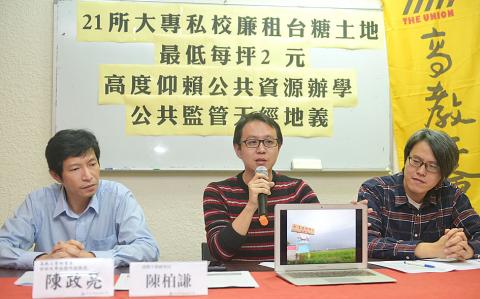Twenty-one private universities and colleges have been renting land from state-owned Taiwan Sugar Corp (Taisugar) for a monthly average of NT$7.6 (US$0.25) per ping (3.3m2), with some paying as little as NT$2.2 or NT$2.3 per ping, suggesting that private universities lack government oversight, the Taiwan Higher Education Union said yesterday.
The union has obtained details on 21 of 61 private universities and colleges that are renting land from the company at a preferential rate of 40 percent off the land’s market value as part a program designed to help schools, union researcher Chen Po-chien (陳柏謙) told a news conference in Taipei.
In more than 80 percent of the schools, more than 70 percent of the land belongs to Taisugar, he said, adding that three private universities — TransWorld University, Taiwan Shoufu University and Tzu Hui Institute of Technology — are entirely built on Taisugar land.

Photo: Chang Chia-ming, Taipei Times
The program has helped each private university save NT$20 million to NT$300 million over the past 50 years, he said, adding that the discount means that the universities profited NT$3.1 billion from government funds.
Given the discounted rent and other government subsidies granted to private universities, the Ministry of Education should increase supervision of school boards and ensure that publicly donated assets are returned to the government, parties or individuals when universities shut down, Chen said.
According to a bill to govern the transformation and closure of private universities and colleges approved by the Executive Yuan in 2017, a school board could maintain control over the school’s assets after it is transformed into a cultural or social welfare institute, he said.
While the bill has yet to pass a legislative review, the union fears it could encourage “irresponsible” school boards to deliberately close down universities to transform them into a more profitable business with government support, Chen said.
For example, the board of Yung Ta Institute of Technology and Commerce has continued to pay a yearly rent of NT$7 million to Taisugar after all faculty and students left following its closure in 2014, probably in an attempt to maintain control over the land and other public assets, he said.
“This is a double waste because the land could be put to better use if Taisugar were not renting it to the school, and the rent the school has been paying could have been used to pay the salaries it owed its teachers,” Chen said.
“In the near future, many private schools will shut down because of the declining birthrate. Their public assets should be immediately returned to local and central governments, and redistributed to schools that need them,” he said.
The ministry should also require the 21 universities to have representatives from civil groups, faculty and students on their board of directors to enhance supervision of their operations, he said, adding that teachers’ and students’ rights should be ensured when schools undergo closures or transformation.

A preclearance service to facilitate entry for people traveling to select airports in Japan would be available from Thursday next week to Feb. 25 at Taiwan Taoyuan International Airport, Taoyuan International Airport Corp (TIAC) said on Tuesday. The service was first made available to Taiwanese travelers throughout the winter vacation of 2024 and during the Lunar New Year holiday. In addition to flights to the Japanese cities of Hakodate, Asahikawa, Akita, Sendai, Niigata, Okayama, Takamatsu, Kumamoto and Kagoshima, the service would be available to travelers to Kobe and Oita. The service can be accessed by passengers of 15 flight routes operated by

Chinese spouse and influencer Guan Guan’s (關關) residency permit has been revoked for repeatedly posting pro-China videos that threaten national security, the National Immigration Agency confirmed today. Guan Guan has said many controversial statements in her videos posted to Douyin (抖音), including “the red flag will soon be painted all over Taiwan” and “Taiwan is an inseparable part of China,” and expressing hope for expedited reunification. The agency last year received multiple reports alleging that Guan Guan had advocated for armed reunification. After verifying the reports, the agency last month issued a notice requiring her to appear and explain her actions. Guan

GIVE AND TAKE: Blood demand continues to rise each year, while fewer young donors are available due to the nation’s falling birthrate, a doctor said Blood donors can redeem points earned from donations to obtain limited edition Formosan black bear travel mugs, the Kaohsiung Blood Center said yesterday, as it announced a goal of stocking 20,000 units of blood prior to the Lunar New Year. The last month of the lunar year is National Blood Donation Month, when local centers seek to stockpile blood for use during the Lunar New Year holiday. The blood demand in southern Taiwan — including Tainan and Kaohsiung, as well as Chiayi, Pingtung, Penghu and Taitung counties — is about 2,000 units per day, the center said. The donation campaign aims to boost

The Central Weather Administration (CWA) said a magnitude 4.9 earthquake that struck off the coast of eastern Taiwan yesterday was an independent event and part of a stress-adjustment process. The earthquake occurred at 4:47pm, with its epicenter at sea about 45.4km south of Yilan County Hall at a depth of 5.9km, the CWA said. The quake's intensity, which gauges the actual effects of a temblor, was highest in several townships in Yilan and neighboring Hualien County, where it measured 4 on Taiwan's seven-tier intensity scale, the CWA said. Lin Po-yu (林柏佑), a division chief at the CWA's Seismological Center, told a news conference